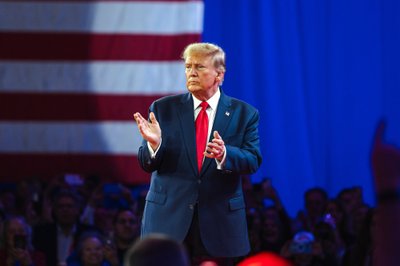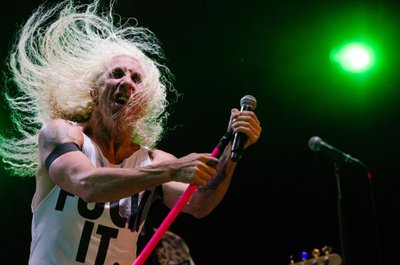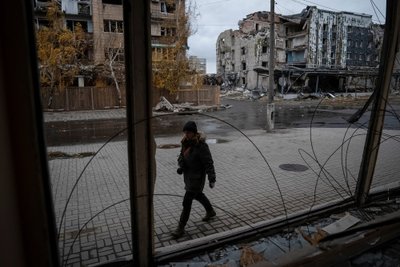Sometimes a song takes on a life of its own. Twisted Sister’s "We’re Not Gonna Take It" is one of the most iconic hits of the 1980s, but it has gone through an intriguing transformation, a phenomenon not uncommon with successful songs. The track has become a staple in pop culture and is widely used in advertising. However, in U.S. politics, it has morphed into an anthem, adopted by numerous politicians for their campaigns. Donald Trump himself used it – until Snider barred him from doing so. "We’re Not Gonna Take It" has also become the main protest song for striking teachers, civil servants, and laborers. On January 6, 2021, it was sung by the crowd incited by Trump who stormed the Capitol.
But Dee Snider stands out for another reason. Alongside Arnold Schwarzenegger, he’s been one of the most vocal U.S. celebrities advocating for his fellow citizens to support Ukraine in its fight against Russia. Unlike many stars who speak out once or twice, Snider has persistently pushed this message throughout the entire war and continues to do so. He himself says he understands the plight of nations like Lithuania and Ukraine. Yet, he fears that American indifference could spell disaster for the entire world.
– Everyone’s talking about the election and Donald Trump. What were your initial thoughts after Election Day when it was clear Trump would become the next president? And what do you think lies ahead for the United States?
– This victory wasn’t narrow, and the results are indisputable. This is what the majority wants. It’s painful to see that 45% of women voted for him. 45% – despite how under his administration, abortion rights were restricted and women’s rights were cut back. It’s also troubling to see so many young men supporting him, often because they don’t want to see a woman president. That’s the reality today. There’s still genuine racism in America, yet Latino men and Black men, not all but many, voted for Trump. In Michigan, Muslims who didn’t support Trump voted for a third-party candidate, yet any third-party support, or abstaining from voting, effectively helped Trump – whether they realize it or not. It’s sad to witness this shortsightedness.
I’m disappointed that most of my countrymen, both men and women, can’t see the big picture. They don’t view the world as one interconnected entity, as a single humanity. We need to care about other countries and their well-being – like if something terrible happens where you live or in Ukraine, and Russia invades. That’s also not good for America and Americans, but most Americans were more worried about the price of eggs. And I understand. But that’s a small picture. We need eggs, but electing Trump as president has far more global repercussions, affecting freedom and other critical issues worldwide.

– Are Americans and America capable of surviving another four years under Donald Trump?
– I don’t have the answer to that. I live in a large mansion with high walls and own a lot of guns. Do I want to use them? No. Do I want to hide from the world behind my walls? No. But again, as I said, I’m not average American; most people don’t have what I have. I’m not saying this to boast, but I understand others and care about freedom – real freedom that is for everyone. I’ve always said that if we worked as hard for others’ freedom as we do for our own, the world’s problems would be solved if we cared as much for others’ freedom as for our own. Then there’d be no problems. But most people are selfish and only care about their freedom; they don’t think about others. And that’s sad.
– I want to ask about the iconic song "We’re Not Gonna Take It", which has become a political anthem in the U.S. Many politicians have used it in their campaigns. Have you ever felt uncomfortable with how the song has been used? And did you ever imagine it becoming a political hit?
– We’re Not Gonna Take It… I knew it was a great song. I knew it was a hit, an anthem, but it has taken on a life of its own, beyond me, my band, and heavy metal. It’s become a folk song. The world knows this song. As a young man, I sang it as a rebellion against the world – against my parents, teachers, bosses, friends, the record label – that’s what I made it about. Now, it belongs to everyone.
It’s a song played at sports events. I saw 300,000 Indians singing "We’re Not Gonna Take It" in a stadium. It was unbelievable. I’ve seen it at protests, on teachers’ strikes, union picket lines. And I’ve seen fascists use it. I didn’t expect that, and I didn’t want that. But I can’t stop them from singing it – that’s freedom of speech. I wrote it for everyone. „Rolling Stone“ once criticized it, asking, We’re Not Gonna Take It – take what from whom? It was a bad review. I explained that the idea is that the song is for anyone who’s angry about something. I never imagined Nazis singing it. I never imagined dangerous, violent people singing it when storming the Capitol on January 6. I didn’t see that coming. But I can’t stop them. All I can do is distance myself and say I don’t support certain political groups – that’s all.

– Many were deeply moved by the video you made in support of Ukraine. It was a big story in Ukraine on that day. Why did you decide to record and publish that message?
– I opposed the Russian invasion from day one. As I said in that video, my grandfather was Ukrainian, and he lived under Russian rule, in total oppression. His father was shot dead by Russian soldiers on the street right in front of him when he was a child. So, I have no love for Russia. After the fall of the Berlin Wall, after Glasnost, things changed. And people are people. We went over there and played music for them. Love, connected through music, is an amazing thing. But now Putin wants to turn back time. He wants to make Russia ’great’ again, just as Trump wants to bring back America’s past. But those old days weren’t good days. So, now that they’re the oppressors again, I’m taking a stand against them. Zelensky and his team asked me to record the message, and I was glad to do it. I’d already been vocal about it.
– Do Americans care about what’s happening in Ukraine?
– Sadly, many Americans voted for Trump, knowing how Trump tried to blackmail Zelensky years ago. They wanted to impeach him for withholding military aid, demanding Ukraine dig up dirt on Hunter Biden. He’s promised to end the Ukraine war, but in his view, that means Ukraine giving up some territory to Russia. That’s his idea of ’ending’ the war. His supporters even claim the aid to Ukraine is wasted – it’s all lies. They want to stop helping Ukraine. Many in this country want to cut off aid. But they don’t realize that by supporting Ukraine, we’re also supporting ourselves financially, as the weapons we supply create jobs. The arms companies get orders, so people are employed. War has always benefited industry. We’re not just handing Zelensky billions of dollars; we’re giving him weapons made here in the U.S. that also bolster our own economy. But people in America don’t understand that.
– You’ve seen the world through many different times. Do you think these difficult times we’re experiencing now, both in America and globally, will eventually end? What’s your take on all of this?
– My wife is spiritual, not so much religious in the sense of ’Jesus is my...’ but more on a journey of spirituality and seeking truth. My whole family is like that—they’re interested in finding the truth, exploring ayahuasca and mushrooms, and looking deeper. It doesn’t appeal to me, but I respect their choice and the fact they want to know more. I tell them I don’t want to know the truth if I don’t need to. I’m a wealthy rock star, living with a hot wife, and I’m happy. If this isn’t the truth, I don’t want to be like Keanu Reeves in "The Matrix", stuck on a grimy spaceship eating sludge. No, no, no. Leave me in my mansion with my cars and my good life. I’m happy.
But they tell me this is the time that was foretold, a time of change. They say it’s happening now, and that every religion predicted this period would come. They say it’s a time of healing, and we must go through it. There will be a lot of pain and suffering, but in the end, we’ll come out better. I ask them, ’Can’t we do it without the pain and suffering?’ Because it’s terrible, especially when you’re the one suffering, like those living in Ukraine. It’s just awful. But they tell me there are brighter days ahead, though we still have a few more years of hardship. It’s an absolutely awful answer. I wish I had something better to say, but that’s all I’ve got.

– So… you don’t believe there’s anything good in store for us?
– Nothing good. Not a thing. But I would ask people to remember that we have more in common than differences. One thing we all share and love is music. I’ve been honored to perform and sing my songs all around the world. Wherever we’ve gone, the joy, energy, and excitement are the same. The same songs, people singing along to the same words in America, Estonia, Japan, and beyond.
There’s a book called "Heavy Metal Islam". It’s fascinating because it shows how the metal scene in the Middle East, among all those warring countries, exists underground and transcends all boundaries. It crosses religious divides—Muslims, Jews, Christians—all united by a love for heavy metal. And that gives me hope. Wherever I go in the world, I see this shared passion and love for music. And it’s not just my music. Look at Taylor Swift’s tours; wherever she goes, it’s the same.
It’s important to remember that this means we have more in common than we think, more than our governments allow us to believe. Unfortunately, we’re all somewhat held hostage by our governments. I’m bound by mine, Ukrainians, Japanese, Canadians by theirs—it affects everyone. But in my experience, we’re all pretty similar. Our jobs may differ, but we’re just trying to live good lives, have families and friends. So keep that in mind and remember that despite all this chaos, we have many similarities, and we’re much closer to each other than we think because we share art and value great art.
